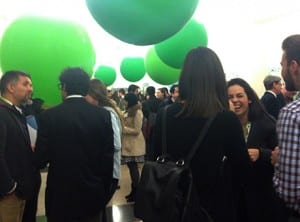Celebrating 50 years of sustainability in architecture at The Bartlett — Building Better Buildings at UCL IEDE
By ucftc44, on 18 February 2016
 The ‘Building Better Buildings: 50 years of Environmental Design and Engineering at The Bartlett’ event on the 15th February was a huge success. The IEDE Director, Prof Mike Davies, opened the event by presenting the two key themes of the Institute’s current research portfolio: building physics and systems thinking. This was followed by talks by Simon Hart, Team Leader of the Built Environment at Innovate UK, who presented the Building Performance Evaluation Programme, and Rob Pannell, Managing Director of the Zero Carbon Hub, who emphasised the need to stimulate industry investment to close the building performance gap. According to the speakers, we still do not fully understand the problem. People in the industry do care but there is a lack of proper training of the workforce. Research funding causes ‘secret knowledge’ and we need to find a way to release it into the public domain. On the other hand, building performance evidence creates a huge amount of value for the industry and the digital economy is growing faster than any other part of the economy. In line with these trends, the Digital Catapult’s Building Data Exchange platform and Zero Carbon Hub’s illustrated guides to building energy efficient homes are clearly steps in the right direction.
The ‘Building Better Buildings: 50 years of Environmental Design and Engineering at The Bartlett’ event on the 15th February was a huge success. The IEDE Director, Prof Mike Davies, opened the event by presenting the two key themes of the Institute’s current research portfolio: building physics and systems thinking. This was followed by talks by Simon Hart, Team Leader of the Built Environment at Innovate UK, who presented the Building Performance Evaluation Programme, and Rob Pannell, Managing Director of the Zero Carbon Hub, who emphasised the need to stimulate industry investment to close the building performance gap. According to the speakers, we still do not fully understand the problem. People in the industry do care but there is a lack of proper training of the workforce. Research funding causes ‘secret knowledge’ and we need to find a way to release it into the public domain. On the other hand, building performance evidence creates a huge amount of value for the industry and the digital economy is growing faster than any other part of the economy. In line with these trends, the Digital Catapult’s Building Data Exchange platform and Zero Carbon Hub’s illustrated guides to building energy efficient homes are clearly steps in the right direction.
Fascinating, cutting-edge work on building performance evaluation case studies was presented during the morning and afternoon sessions. It was mentioned that there is a lack of robust baselines to measure the true extent of the performance gap and an urgent need to disclose, share and publicise the data and root causes of building underperformance. Over complexity is the enemy of good building performance. There is a need for a human-centric approach towards understanding the performance gap and a new professionalism for the built environment. There is also enormous value in a motivated design team with inputs from clients, staff and facilities managers. It was indicated that the design of intuitive building controls, human behaviour in buildings, and climate change related risks, such as indoor overheating, are some of the issues we need to get a grip on in the future. Justin Bere from Bere Architects suggested that the academic research on building performance evaluation should be a national priority.
The BSEER Director, Prof Tadj Oreszczyn, chaired an excellent industry and academia panel session at the end of the event. In summary, our knowledge on the building performance gap has improved considerably over the last decades, and whilst the technologies are roughly the same, there are nowadays more good practice examples. However, there is less time to deliver low carbon buildings; to meet the UK’s carbon reduction targets, 1 home needs to be fully retrofitted every minute until the middle of the century. Emerging themes on solutions from the panel included: the need for more research and building regulations, better communication between built environment professional silos and information disclosure. This is in agreement with many industry events suggesting that deregulation is not the solution, thus asking for the improvement rather than the reduction of building regulations. The importance of a proper functional digital infrastructure, feedback and harmonised benchmarking for building performance was emphasised. There are also significant opportunities for product design and engineering, and digital innovation in the built environment. As a response to these ongoing challenges, three exciting new initiatives were announced during the event: the establishment of the UK Centre for Moisture in Buildings based at UCL (Prof Mike Davies) and the creation of two new courses, the MEng in Engineering and Architectural Design (Prof Dejan Mumovic) and the MSc in Health, Wellbeing and Sustainable Buildings (Marcella Ucci) proposed for launch in 2017.
Lively discussions continued over drinks at the South Cloisters where the Dean of the Bartlett, Professor Alan Penn, took us through the history of the group, linking art and science, architecture and engineering, psychology, computer science and fabrication. As a member of the increasingly growing EDE community for the last 10 years, I thoroughly enjoyed this inspiring celebration of the history and ambition of our group at UCL IEDE and it was fantastic to catch up with so many EDE alumni, colleagues and friends who attended the event. Here’s to the next 50 years of Environmental Design and Engineering at The Bartlett!
 Close
Close


